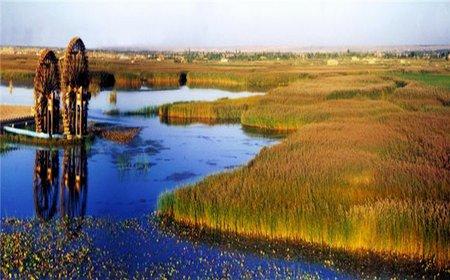(单词翻译:单击)
听力文本
This is Scientific American — 60-Second Science. I'm Christopher Intagliata.
As Houston begins recovery efforts from Hurricane Harvey, a new storm threat—Hurricane Irma—is barreling west towards the Caribbean and Florida. We have few defenses against hurricanes' lashing rains and wind and storm surge—but nature does provide one.
"Wetlands act in two ways to reduce the impacts of storms. They reduce storm surge by acting as a wall or a barrier and they act as a sponge by soaking up the waters that come down via rainfall."
Michael Beck is a coastal scientist at The Nature Conservancy and the University of California Santa Cruz. He says as we've paved over swampy coastlines, we've changed how storm waters flow. Or, for an analogy a little closer to home:
"Rain falls on your driveway, it's going to run straight out into the street. Rain falls in your garden it's going to soak into the ground. When you've done that at the scale of whole watersheds, there's no place for that water to go when it rains."

But some wetlands do remain. Beck and his colleagues teamed up with the insurance industry, and, using the industry's risk assessment models, asked: how much more damage would Hurricane Sandy have delivered if all the eastern seaboard's wetlands were gone? And they found that marshy coastlines saved some $625 million dollars in direct flood damages—or about one percent of Sandy's total cost.
The researchers also battered Ocean County, New Jersey, with thousands of hypothetical storms using flood models. And they found that wetlands cut flood damages there by 16 percent, compared to areas of the county where wetlands are gone. The study is in the journal Scientific Reports.
Next, it's up to local governments and the insurance industry to take notice. "Certainly we hope that we will continue to conserve wetlands in part for their intrinsic beauty and the importance of nature." But he says by putting a price-tag on the economic benefit of wetlands it might change the conversation...about conservation.
Thanks for listening for Scientific American — 60-Second Science Science. I'm Christopher Intagliata.
参考译文
这里是科学美国人——60秒科学。我是克里斯托弗·因塔利亚塔。
当休斯顿刚开始从飓风“哈维”造成的破坏中恢复时,另一场风暴威胁——飓风“艾玛”正在迅速向西移动,逼近加勒比海和佛罗里达州。对于飓风带来的狂风暴雨和风暴潮,我们几乎无法抵抗,但是大自然为我们提供了一道防护。
“湿地有两种降低风暴影响的方法。其中一种是像墙或屏障那样抵御风暴潮,另一种是像海绵那样吸收雨水。”
迈克尔·贝克是大自然保护协会和加州圣克鲁斯大学的海岸科学家。他表示,我们在遍布湿地的海岸线铺路时,改变了暴雨积水的流向。或者打个更贴近生活的比方:
“落到你家私车道上的雨水会直接流到街上。而落在你家花园里的雨水会渗透到地下。因此,如果整个流域都被改变,那下雨时雨水就无处可以去了。”
但有些湿地还可以吸收水分。贝克和同事同保险业进行合作,利用保险业的风险评估模型提出问题:如果美国东海岸所有湿地都消失,那飓风“桑迪”造成的损失比现在多多少?他们发现,有湿地的海岸可以使洪灾造成的直接损失减少约6.25亿美元,大约为“桑迪”造成总损失的1%。
研究人员还用洪水模型制造了数千次假想风暴,“重创”新泽西州海洋县。他们发现,与该县的无湿地区域相比,洪水在有湿地区域造成的损失降低了16%。这一研究结果发表在《科学报告》期刊上。
接下来,当地政府和保险业要注意了。“我们当然希望能继续保护湿地,部分原因是为了湿地本身的美丽以及对自然的重要性。”但是他也表示,为湿地的经济效益贴上价签,可能会改变湿地保护的对话方式。
谢谢大家收听科学美国人——60秒科学。我是克里斯托弗·因塔利亚塔。
译文为可可英语翻译,未经授权请勿转载!
重点讲解
重点讲解:
1. soak up 吸收(液体);
例句:The cells will promptly start to soak up moisture.
细胞会立即开始吸收水分。
2. team up with (与…)组队;(与…)协作;
例句:I teamed up with David on the project.
这个项目我和大卫搭档。
3. compared to 与…相比;和…比起来;
例句:He's a mere slip of a lad compared to his brother.
跟他哥哥一比,他不过是个小毛孩。
4. take notice 注意;关注;
例句:This should make people sit up and take notice.
这件事应引起人们的关注。


